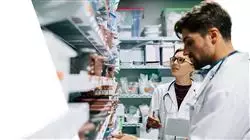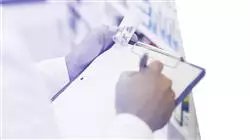University certificate
The world's largest faculty of pharmacy”
Introduction to the Program
In this 100% online Postgraduate diploma you will have updated contents and first level didactic tools that will allow you to fully manage the Hospital Clinical Pharmacology "

According to official figures and assessments of the World Health Organization, many deaths in the hospital environment are linked to inadequate selection of therapies and drugs offered to patients. This problem is closely linked to the fact that many pharmacy professionals are not up to date with the main innovations in this field and are not familiar with the most advanced products and intervention protocols available to them. This prevents them from fully assisting medical personnel in the care of gastrointestinal, cardiac or respiratory pathologies.
TECH, based on this incidence, has designed a rigorous program that will allow students to analyze different drugs of last generation that are used today for the approach of unstable angina, heart failure or the management of tachycardia. Also, the main brocodilators used to treat Obstructive Pulmonary Disease or the antibiotics and antivirals that have revolutionized the management of respiratory infections such as COVID-19 will be discussed.
On the other hand, the agenda covers the most efficient prokinetics and antiemetics to carry out nutritional therapeutic interventions, among other pharmacological management related to the Gastrointestinal System. Finally, this program emphasizes on the development, progression and complications resulting from Oncohematological Diseases and which are the most advanced drugs that allow to offer a better quality of life to people suffering from them.
All the contents of this program are integrated in a 100% online platform and are complemented with high quality multimedia resources, such as videos, infographics or interactive summaries. In addition, the Relearning methodology, exclusive to TECH, will enable each student to strengthen their practical skills in a more expeditious and flexible way. At the same time, each participant will have the opportunity to adapt this update to the schedules of their convenience since the study times are not hermetic and do not require unnecessary travel to an on-site academic center.
Acquire a high level of specialization through a personalized academic model, which allows you to organize your studies according to your schedule and individual needs"
This Postgraduate diploma in Hospital Clinical Pharmacology contains the most complete and up-to-date scientific program on the market. The most important features include:
- The development of practical cases presented by experts in Pharmacy, Hospital Management, among others
- Graphic, schematic, and practical contents with which they are created, provide scientific and practical information on the disciplines that are essential for professional practice
- Practical exercises where self-assessment can be used to improve learning
- Its special emphasis on innovative methodologies
- Theoretical lessons, questions to the expert, debate forums on controversial topics, and individual reflection assignments
- Content that is accessible from any fixed or portable device with an Internet connection
Throughout this academic itinerary you will be able to address prokinetics and antiemetics implemented in Hospital Clinical Pharmacology to develop efficient nutritional therapies"
The program’s teaching staff includes professionals from sector who contribute their work experience to this educational program, as well as renowned specialists from leading societies and prestigious universities.
Its multimedia content, developed with the latest educational technology, will provide the professionals with situated and contextual learning, i.e., a simulated environment that will provide an immersive education programmed to learn in real situations.
The design of this program focuses on Problem-Based Learning, by means of which the professionals must try to solve the different professional practice situations that are presented throughout the academic course. For this purpose, the students will be assisted by an innovative interactive video system created by renowned experts.
In this program you will analyze the most advanced antihypertensive and antiarrhythmic drugs to treat conditions such as deep vein thrombosis"

Through this university program you will delve into the latest generation drugs that facilitate the care of oncohematologic emergencies and allow solving their various complications"
Why study at TECH?
TECH is the world’s largest online university. With an impressive catalog of more than 14,000 university programs available in 11 languages, it is positioned as a leader in employability, with a 99% job placement rate. In addition, it relies on an enormous faculty of more than 6,000 professors of the highest international renown.

Study at the world's largest online university and guarantee your professional success. The future starts at TECH”
The world’s best online university according to FORBES
The prestigious Forbes magazine, specialized in business and finance, has highlighted TECH as “the world's best online university” This is what they have recently stated in an article in their digital edition in which they echo the success story of this institution, “thanks to the academic offer it provides, the selection of its teaching staff, and an innovative learning method aimed at educating the professionals of the future”
A revolutionary study method, a cutting-edge faculty and a practical focus: the key to TECH's success.
The most complete study plans on the university scene
TECH offers the most complete study plans on the university scene, with syllabuses that cover fundamental concepts and, at the same time, the main scientific advances in their specific scientific areas. In addition, these programs are continuously being updated to guarantee students the academic vanguard and the most in-demand professional skills. In this way, the university's qualifications provide its graduates with a significant advantage to propel their careers to success.
TECH offers the most comprehensive and intensive study plans on the current university scene.
A world-class teaching staff
TECH's teaching staff is made up of more than 6,000 professors with the highest international recognition. Professors, researchers and top executives of multinational companies, including Isaiah Covington, performance coach of the Boston Celtics; Magda Romanska, principal investigator at Harvard MetaLAB; Ignacio Wistumba, chairman of the department of translational molecular pathology at MD Anderson Cancer Center; and D.W. Pine, creative director of TIME magazine, among others.
Internationally renowned experts, specialized in different branches of Health, Technology, Communication and Business, form part of the TECH faculty.
A unique learning method
TECH is the first university to use Relearning in all its programs. It is the best online learning methodology, accredited with international teaching quality certifications, provided by prestigious educational agencies. In addition, this disruptive educational model is complemented with the “Case Method”, thereby setting up a unique online teaching strategy. Innovative teaching resources are also implemented, including detailed videos, infographics and interactive summaries.
TECH combines Relearning and the Case Method in all its university programs to guarantee excellent theoretical and practical learning, studying whenever and wherever you want.
The world's largest online university
TECH is the world’s largest online university. We are the largest educational institution, with the best and widest online educational catalog, one hundred percent online and covering the vast majority of areas of knowledge. We offer a large selection of our own degrees and accredited online undergraduate and postgraduate degrees. In total, more than 14,000 university degrees, in eleven different languages, make us the largest educational largest in the world.
TECH has the world's most extensive catalog of academic and official programs, available in more than 11 languages.
Google Premier Partner
The American technology giant has awarded TECH the Google Google Premier Partner badge. This award, which is only available to 3% of the world's companies, highlights the efficient, flexible and tailored experience that this university provides to students. The recognition as a Google Premier Partner not only accredits the maximum rigor, performance and investment in TECH's digital infrastructures, but also places this university as one of the world's leading technology companies.
Google has positioned TECH in the top 3% of the world's most important technology companies by awarding it its Google Premier Partner badge.
The official online university of the NBA
TECH is the official online university of the NBA. Thanks to our agreement with the biggest league in basketball, we offer our students exclusive university programs, as well as a wide variety of educational resources focused on the business of the league and other areas of the sports industry. Each program is made up of a uniquely designed syllabus and features exceptional guest hosts: professionals with a distinguished sports background who will offer their expertise on the most relevant topics.
TECH has been selected by the NBA, the world's top basketball league, as its official online university.
The top-rated university by its students
Students have positioned TECH as the world's top-rated university on the main review websites, with a highest rating of 4.9 out of 5, obtained from more than 1,000 reviews. These results consolidate TECH as the benchmark university institution at an international level, reflecting the excellence and positive impact of its educational model.” reflecting the excellence and positive impact of its educational model.”
TECH is the world’s top-rated university by its students.
Leaders in employability
TECH has managed to become the leading university in employability. 99% of its students obtain jobs in the academic field they have studied, within one year of completing any of the university's programs. A similar number achieve immediate career enhancement. All this thanks to a study methodology that bases its effectiveness on the acquisition of practical skills, which are absolutely necessary for professional development.
99% of TECH graduates find a job within a year of completing their studies.
Postgraduate Diploma in Hospital Clinical Pharmacology
Are you ready to take a bold step in your scientific career and open your way to a world of opportunities in the field of pharmacology? Get ready to discover the innovative Postgraduate Diploma in Hospital Clinical Pharmacology that TECH Global University has to offer! TECH's School of Pharmacy invites you to delve into a program carefully designed to provide you with cutting-edge knowledge and high-level practical skills. Would you like to be part of a select group of students, guided by an exceptional team of faculty, all recognized experts in the field of hospital clinical pharmacology? During this fascinating program, you will explore essential aspects such as drug research and development, pharmacokinetics, pharmacodynamics, pharmacodynamics, and much more - become a specialist in drug evaluation and its application in clinical settings! In addition, you will have the opportunity to participate in simulations and case studies that will prepare you for real-world challenges. The online environment in which the Postgraduate Diploma takes place will give you access to up-to-date study materials, supplementary resources and interactive activities designed to reinforce your understanding and apply your knowledge to practical cases.
Expand your knowledge in Hospital Clinical Pharmacology
TECH Global University is proud to offer you an unparalleled educational experience. Are you ready to acquire skills that will be highly valued in the pharmaceutical industry and healthcare institutions? Upon completion of the program, you will receive a prestigious certificate that will endorse your competencies in Clinical Hospital Pharmacology and will allow you to access diverse job opportunities in research, clinical trials, drug regulation, and more. Dare to be the protagonist of your professional future, study at TECH, where academic excellence and opportunities come together to enhance your development. Don't wait any longer! Enter the world of hospital clinical pharmacology and open doors to a future full of success and fulfillment. Are you ready to take the first step towards a brilliant career? Enroll now and discover the path to success at TECH Global University's School of Pharmacy!
.







